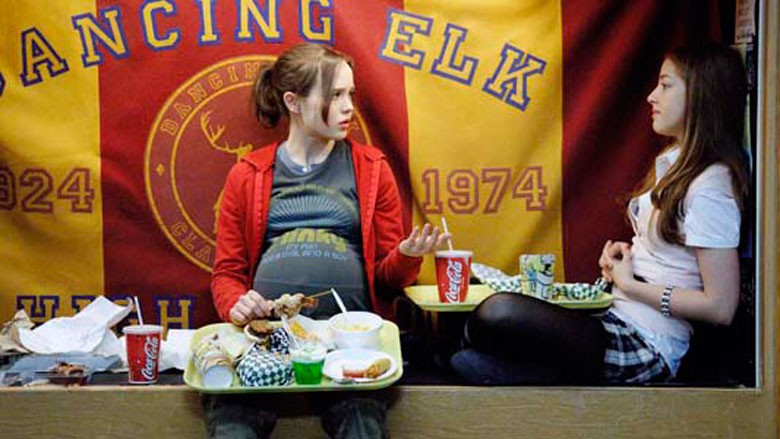‘Life’ at the movies
By John Farrell | January 27, 2016, 10:00 EST
 Ellen Page, left, earned an Academy Award nomination for her role in “Juno.” (Fox Searchlight Pictures)
Ellen Page, left, earned an Academy Award nomination for her role in “Juno.” (Fox Searchlight Pictures) Abortion is not the topic of many movies, and good films that handle the topic well are few and far between. For this month’s theme, I decided to rewind and take a look at a few features that tell a compelling story about women faced with unexpected pregnancies, and how it affects their lives and families.
The British seem to have the edge on American filmmakers here, but let’s start with the U.S. (Spoilers ahead)
Jason Reitman’s popular film “Juno” (2007) is about a high school girl’s decision to have her unexpected baby and give it up for adoption. The movie was a big hit at the close of 2007. It collected four Oscar nominations, including best actress for its Canadian star, Ellen Page, and won the Oscar for best original screenplay by Diablo Cody.
The plot is straightforward: 16-year-old high school student Juno MacGuff finds herself pregnant after a one-time dalliance in a comfy chair with one of her geekier classmates. At first, she has every intention of terminating the pregnancy. She makes an appointment at a clinic, but is deterred when a classmate, who is protesting abortion outside the building, tells Juno her child already has fingernails. The scene is a comic masterpiece as Juno proceeds inside the clinic, and is put off by the receptionist, a perfect stereotype of a classic punk bimbo and bureaucrat, played by fellow Canadian actress Emily Perkins.
The rest of the film follows a fairly standard Hollywood arc. Juno and her dad, played by the redoubtable J. K. Simmons, meet a young couple in the wealthier side of town. The couple is unable to have children and is desperate to adopt. Juno agrees to give up the baby after delivery and asks for no compensation.
The remainder of the film revolves around the complications in the young couple’s relationship as their marriage dissolves. Jennifer Garner is particularly effective given the fairly standard dialogue with which she and co-star Jason Bateman have to work; but it’s the least convincing aspect of the movie.
Juno’s intensifying relationship with the boyfriend who fathered her child is more engaging, but equally contrived. Everything ends well, with Garner adopting the baby on her own and Juno and her boyfriend going back to their lives — considerably happier than when the movie started.
If the whole story is a little too neat in its depiction, the film nevertheless works well because Page is so grounded in her performance. She has a face whose expression belies what her character usually quips. The classic smart-aleck teen, she registers pain beautifully when her parents or her friends cut too close to the bone with their advice and off-the-cuff judgments.
That said, Cody’s script can’t achieve depth for anyone other than her main character and, had it not been for Page, it’s unlikely the film would have been such a success. The dialogue is too often beset by a host of sitcom barbs with deliberate feints to unravel. The scene with the creepy drugstore manager who greets Juno when she buys a pregnancy test kit at the outset of the story is a perfect example. Only in a Hollywood film marketed to a teen audience would you find characters so deliberately outrageous — and completely untrue to life.
A more poignant film, “Bella,” came out just weeks before “Juno.” Smaller and more modest in scope, it nevertheless manages to convey the real anxiety of another young woman facing an unexpected pregnancy in New York City. Nina, played by Tammy Blanchard, gets fired from her job as a hostess at a new Mexican restaurant when she shows up late three days in a row. Like Juno, she took a home pregnancy test and discovered she was pregnant. But unlike Juno, she does not have any wisecracking, sentimental friends or supportive family to help her out.
What she does find is a sympathetic co-worker named José, played by Eduardo Verástigui. José is the restaurant owner’s brother and head chef. He walks off the job for the day to take care of Nina. Without voicing his concern, José listens to her reasons for deciding to have an abortion — reasons that Blanchard conveys poignantly with stoic, though bitter, resignation.
But in the final moment before the procedure, Nina balks and is unable to go through with the abortion. José takes her home to his parents, which becomes a beautiful introduction into the world of a loving Latino family. Here, amidst home-cooked food and tequila, José reveals his own secret to Nina. Once a much sought after pro soccer player, his life was shattered when he ran over a little girl on the street in his convertible. He was sentenced to prison for manslaughter. José senses that Nina’s child could be both his redemption and hers. And it turns out to be the case.
While the whole narrative could easily drown in sentimentality, writer/director Alejandro Monteverde constantly surprises the viewer by shuffling his timeline back and forth between flashbacks of the past (the little girl’s harrowing death) and the present. With this technique, Monteverde lets the characters’ decisions unfold through a series of visual tableaux, rather than through forced dialogue. The film was a hit at the Toronto International Film Festival in 2006, where it took the top prize. While its box office performance was far more modest than “Juno,” it’s nonetheless the better film.
By contrast, “Vera Drake” (2004) and “Philomena” (2013) represent two darker stories that are set in a time when society was far less sympathetic toward pregnant women (married or not) than the one that Juno and Nina inhabit. Despite their unhappy tales, both films paint far more poignant portraits of their protagonists.
“Philomena,” starring Judie Dench, explores the attempt by an elderly Irish woman to find the son she was forced to give up for adoption in the Ireland of 1950. Forced to work in a convent during her pregnancy and beyond, young Philomena finds little kindness beyond that of her fellow wayward girls. These women were sequestered away by a repressed society that only knew one way to handle unwanted pregnancies: deliver the babies in secrecy and sell them to American couples anxious to adopt.
The heart of the film is Judi Dench’s character and the initially jaded journalist Martin Sixsmith, played by Steve Coogan, who agrees to help her find out what happened to her son. Deep down, all Philomena wants to know is whether that little boy who was sent away to the U.S. ever thought about his mother in the ensuing years. In the end, the answer lies in the cemetery on the very grounds of the convent where her son asked to be buried when he knew he was going to succumb to AIDS. Sixsmith’s growing outrage at the Catholic institution, and the administrators who knowingly kept her son’s fate secret, clashes with Philomena’s own gracious instinct to forgive even the most heartless of the nuns.
In “Vera Drake” (2004), postwar London is the setting in which writer/director Mike Leigh weaves his tale of English Philomenas being helped in a far different fashion. Vera, played by the outstanding Imelda Staunton (“Sense and Sensibility,” “Harry Potter and The Order of the Phoenix”) is a hardworking mother of two grown children and the wife of a devoted husband. A dynamo of energy, she scrubs the ornate furniture of wealthy families to supplement the family income. She also pops in on her mother, her friends, and her ailing neighbors to help out whenever she can.
Unbeknownst to her family, Vera also visits desperate single women, pregnant and without any support, and helps them induce abortions in order to escape their predicament. Leigh never reveals how Vera learned the simple operation she performs for the girls, but there is a hint that she herself was a fatherless child who was raised by her unhappy single mother.
When one of her operations goes wrong and the girl ends up in the hospital, the police are alerted and arrest Vera for performing illegal abortions. The tragedy of the film is watching the effect of this revelation on Vera’s shocked family. Leigh is famous as an actor’s director, and even the smallest characters in the film evince a realism and humanity that are much less common in American films.
In an odd way, “Juno,” for all its American openness, depicts a suppression of inner thought and struggle in a hyper-individualistic society that is just as disturbing as the outwardly repressive cultures of England and Ireland in which “Vera Drake” and “Philomena” live out their lives.
Philomena is the most uplifting of all the characters because she made the decision not to bear any ill will toward the people who punished her, either in the past or in the present. Vera Drake accepts her punishment, and the damage it causes her family is heartbreaking. Nevertheless, there is an edge of defiance in her face even at her darkest moment of judgment.
While Leigh is careful not to point his audience in the direction of where the blame for her terrible predicament lies, the film so masterfully recreates the oppressive society of the time that he doesn’t have to. (A Hollywood version would have given Staunton an Oscar-worthy speech, but it would have ruined the entire film.) Leigh is too much a master of his craft: he gives equal attention to the tragedy’s many sides. Particularly disquieting is a young black woman whom Vera visits with her little kit. Even Vera doesn’t know what to say to comfort the horrified girl as it dawns on her that the procedure she’s just undergone is irreversible, and so Vera leaves her to face her own grief.
Taken together, these four films present different perspectives on women with unplanned pregnancies. However, I think Leigh’s film alone steps back and shows the structures of the truly indifferent society, run by good people unable to change it, and how it can crush women precisely when they are most vulnerable. Only Leigh’s film exposes the culture as a whole, and leaves the audience with a greater awareness of what needs to be done by any healthy society that wishes to support women faced with crisis pregnancies.
And that fuller portrayal of a healthy society is a film that still waits to be made. For all the choices our market-based, hyper-individualistic society offers women today, there has yet to be one that truly supports women at every stage of their lives.
John Farrell is the author of “The Day Without Yesterday: Lemaitre, Einstein and the Birth of Modern Cosmology” from Basic Books. He writes about science, technology and media for Forbes.
NBPLifeABC











